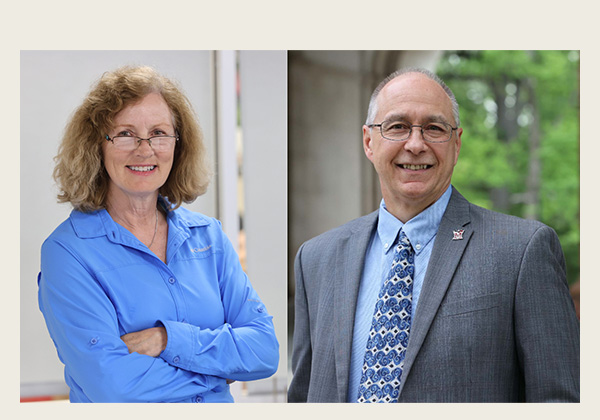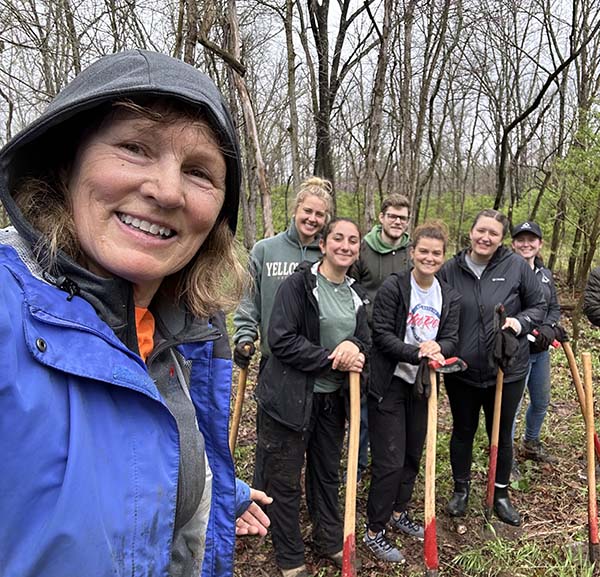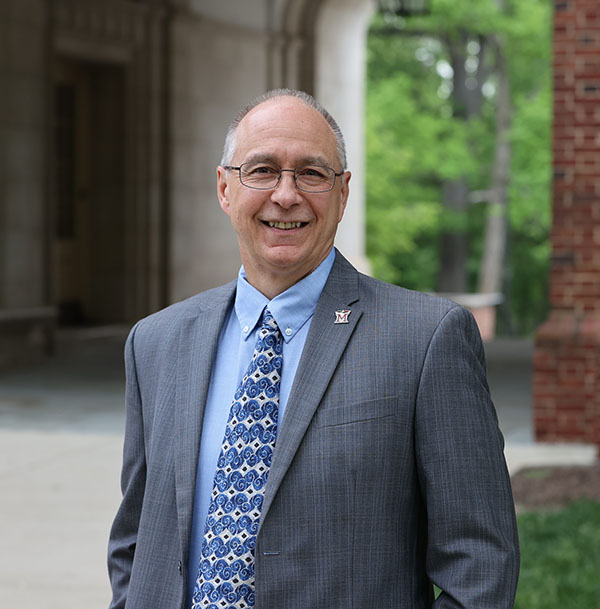Helaine Alessio and Chris Makaroff awarded the Benjamin Harrison Medallion
They are honored with Miami’s most prestigious career faculty award for ‘outstanding contribution to the education of the nation’

Helaine Alessio and Chris Makaroff awarded the Benjamin Harrison Medallion
Miami University has honored two professors — Helaine Alessio and Chris Makaroff — with its most prestigious career faculty award, the Benjamin Harrison Medallion.
The medallion is awarded annually for extraordinary and sustained contributions related to teaching, research, and service over the course of a career at the university.
Alessio, chair and professor of Kinesiology, Nutrition, and Health (KNH), and Makaroff, dean of the College of Arts and Science and professor of Chemistry and Biochemistry, have received the award for "outstanding contribution to the education of the nation."
They were selected for achieving the highest standards of teaching, attaining significant stature within their field, their record of outstanding and enduring service to Miami, and for recognition of influence beyond their primary discipline.

Helaine Alessio
An ‘agent of change” who ‘lives and embodies the teacher-scholar model’
Alessio has demonstrated a tireless commitment to excellence in research, leadership, mentoring, community engagement, and innovative teaching, according to her nominators.
With a national and international reputation for her professional research and leadership, she is among the the top 2% of the most cited scientists globally. Alessio’s research areas include hearing and exercise; oxidative stress and exercise; physical activity promotion, personal and ecological health; and studying excellence in teaching and facilitating student learning.
“Many times it is difficult for administrators to continue the extent of teaching and research that Helaine has been able to sustain through her 17 years of chairing a department,” a nominator said.
Alessio is co-author of two books, “Health and Hearing” (2024) and “Oxidative Stress in Exercise and Aging” (2006); 13 book chapters; and 56 journal publications.
Her work has been supported by funding from the National Institutes of Health and private foundations.
Her work on academic integrity includes co-editing a special edition of a journal on the topic that was the most widely published for the Journal of Excellence in College Teaching. This research on online learning involved a series of groundbreaking studies that found concrete evidence of the prevalence of cheating in online tests and quizzes, and examined the utility of proctoring to combat such cheating. This work was ahead of its time and demonstrated “profound influence beyond her primary discipline that affects universities around the world,” according to a nominator.
Alessio seeks out opportunities to work at the intersections of disciplines, recognizing “that some of the most pressing challenges we face today do not fit into a single academic silo,” a nominator said. “Notably, two current exceptional interdisciplinary projects underscore the pinnacle of her collaborative endeavors: the exploration of "How Taste Perception is Influenced by Augmented Reality" and the creation of an outdoor classroom/pavilion at a Hueston Woods State Park trailhead. These endeavors exemplify Dr. Alessio's unparalleled commitment to fostering collaboration, involving undergraduates from diverse disciplines, and embodying the ethos of true research synergy.”
Service
Her professional activities include having served as president and past-president of the Midwest chapter of the American College of Sports Medicine (ACSM), among other positions for the organization. She has served on numerous committees for the national ACSM, including as co-chair of the Cellular Signaling and Oxidative Stress Interest Group, and member of the research Advisory Council. She currently serves as ambassador and member of the national organization Climate for Health.
Alessio also serves as associate editor of Frontiers in Public Health – Public Health Education and Promotion; a member of the editorial board for Frontiers in Physiology – Oxidative Physiology; board of directors for the Midwest American College of Sports Medicine; associate editor for the International Journal of Health, Wellness, and Society; and the editorial board of the Journal on Excellence in College Teaching.
As chair of the department of KNH, Alessio led a substantial increase in undergraduate enrollment, from 1,100 in 2007 to 1,600 in 2020, with a 90% retention rate for first-year students. She successfully guided the transition of the Sport Leadership and Management (SLAM) major into its own department, while maintaining strong enrollment and achieving a 25% increase in graduate enrollment. She orchestrated a $1 million renovation plan, completed within budget in 2022, that enhanced teaching facilities and spaces in Phillips Hall.
Among other Miami committees, she served on the Miami University Faculty Senate and chaired the Senate Working Sessions; she also served on the Honors Committee. She is currently a member of the Miami University Bachelor Reserve and Other Natural Areas Committee, among other committees.
She served as co-chair of the Miami University Sustainability Committee from 2018-2022 and helped to develop a vision and plan for Miami to commit to carbon neutrality.
Teaching, mentoring
Alessio’s nominators note her exceptional mentorship of young scholars, guiding an average of five undergraduate and two graduate students each year in research projects. More than 66 of these students have co-authored published manuscripts with her, and more than 120 have collaborated on presentations at professional conferences.
She is also noted for her teaching excellence and her dedication to providing students with transformative educational experiences, such as the Study Abroad program to Africa she developed, “a testament to her passion for global health and cross-cultural understanding,” a nominator said.
Community engagement, sustainability
Alessio's commitment to community engagement and well-being “is nothing short of inspirational” a nominator said. It is evident in her contributions to the Oxford Senior Center’s weekly exercise and wellness programs and the Hueston Woods classroom project. Her advocacy for active transportation and environmental sustainability is equally commendable, the nominator said.
Alessio submitted the first successful application for Miami to be recognized by the League of American Bicyclists as a Bicycle Friendly University in 2018. Her involvement in the ACSM task force ActivEarth and their significant contributions to the publication "Climate change, air pollution, and physical inactivity: Is active transportation part of the solution?" underscores her commitment to a healthier, more sustainable world. Her advocacy on this committee contributed to a bill to direct the Secretary of Transportation to carry out an active transportation investment program to make grants to eligible applicants to build safe and connected options for bicycles and walkers within and between communities. It was incorporated into H.R. 3684: Infrastructure Investment and Jobs Act and signed into law in 2021.
She is also a member of the city's Oxford Area Trails committee, the Oxford AFS- Student Exchange Support Committee, and the Oxford Senior Center and Miami University Affiliation Board.
Alessio said her plan is “to continue to be a lifelong learner, citizen scientist, educator, and motivator so that I can join others in learning how to best live on this Earth and contribute to the greater good.”

Chris Makaroff
Educator, 'trusted leader'
For 35 years, Makaroff has helped outline the path of Miami as both an educator and administrator.
Makaroff began his Miami career in 1989 as an assistant professor. From that time to his most recent role as dean of the College of Arts and Science (CAS), Makaroff has made lasting contributions to teaching, mentoring, research, and service at the university.
“His significant efforts and expertise have shaped Miami and facilitated its success,” wrote one nominator.
Makaroff earned his bachelor’s degree in Biochemistry from the University of Michigan-Dearborn before obtaining a Ph.D. from Purdue University. He joined Miami following a three-year stint at the University of Michigan as a postdoctoral research fellow.
Makaroff became chair of Miami’s Department of Chemistry and Biochemistry in 2003, a position he held for nearly a decade before beginning his tenure as associate dean in 2012.
Named interim dean of CAS in 2015, Makaroff was elevated to the permanent role that same year. He was named Miami Sigma Xi Research of the Year in 2004 and the Distinguished Scholar of the Graduate Faculty the following year.
In 2009, Makaroff earned the Miami University Distinguished Scholar accolade. He has taught 19 different courses at the university.
Makaroff has mentored more than 200 undergraduates, 21 graduate students, and 12 post-doctoral researchers, while also securing nearly $2 million in external educational funding for scholarships, research programs, and undergraduate fellowships and leading the procurement of close to $46 million for Miami as an administrator.
“Over the course of his career, he has provided students with his time, talent, and access to the many resources at Miami, as well as seeking and obtaining external resources that help ensure every student at every level has a positive and rich learning experience,” according to one nomination.
Another nominating letter praised Makaroff for his steady judgment, calm demeanor, diplomacy, and unshakeable ethics.
Service
“Overall, Dr. Makaroff exemplifies Benjamin Harrison’s model of service to Miami University and to the broader community,” wrote the external nominator. “He is a wonderful connector of people and ideas.”
One example is Makaroff’s work with Interact for Health, a nonprofit that works with communities to advance health justice to ensure people are healthy and thriving. Makaroff has been a member of Interact for Health’s board of directors since 2017 and served as vice-chair in 2023-24.
Makaroff and Miami teamed with Interact for Health to strengthen awareness of and gain access to recovery housing. After issuing a report on the availability of recovery housing in the region, Interact for Health and Miami worked with the community to develop the R-Silience app, which transformed how individuals and families can search for the right recovery house.
“Dr. Makaroff has been instrumental in facilitating ongoing partnerships like this with Miami University faculty, staff, and students that make a positive impact in our community,” wrote an external nominator.
While Makaroff has served in an administrative position for several years, he’s continued to mentor and guide students, all the while remaining committed to providing an engaging and experiential learning experience for Miami students.
Additionally, with a research focus on multi-disciplinary approaches to understanding the relationship of protein structure to biological function, Makaroff has published 80 peer-reviewed articles and book chapters. Twenty of his peer-reviewed manuscripts have featured one or more undergraduates as co-authors.
Makaroff obtained nearly $3 million in external funding for research as principal investigator, and as co-principal investigator, he helped Miami secure $2.2 million in collaborations with colleagues. Makaroff also has given 37 invited seminars at academic and industrial colloquia along with 19 invited presentations at national and international scientific conferences.
Makaroff served on the editorial board of Plant Signaling and Behavior from 2005-2011, as associate editor of BMC Plant Biology from 2011-2013, and as associate section editor of that publication from 2013-2016.
“The recognition of Prof. Makaroff as an outstanding scientist is also supported by the many invited presentations he has given at national and international conferences and at academic institutions,” wrote a nominator. “He has also been well supported by numerous research grants from federal agencies, including NOH, NSF, and USDA. His expertise has also benefited colleagues via his service at journal editors, manuscript and grant reviewers, and external reviewers of colleagues at other institutions.”
Nominators lauded Makaroff for his Miami service work – he’s spent time on more than 40 university committees – including eight years with the Fiscal Priorities and Planning Committee where Makaroff built a deep understanding of university finances.
“He became a known and trusted leader then,” one nominator said.
Added another: “Chris is one of our strongest influencers. He is always ready to clearly articulate the case for what is needed for student and faculty success, and he is able to leverage his communications to engage support for the university. He has been one of Miami University’s staunchest supporters and a passionate and effective advocate.”
Makaroff thanked his family, colleagues, and students during the annual University Awards Ceremony earlier in the semester.
“You can’t do it by yourself,” Makaroff said.
“I owe a lot to Miami University, and it’s been a great run.”